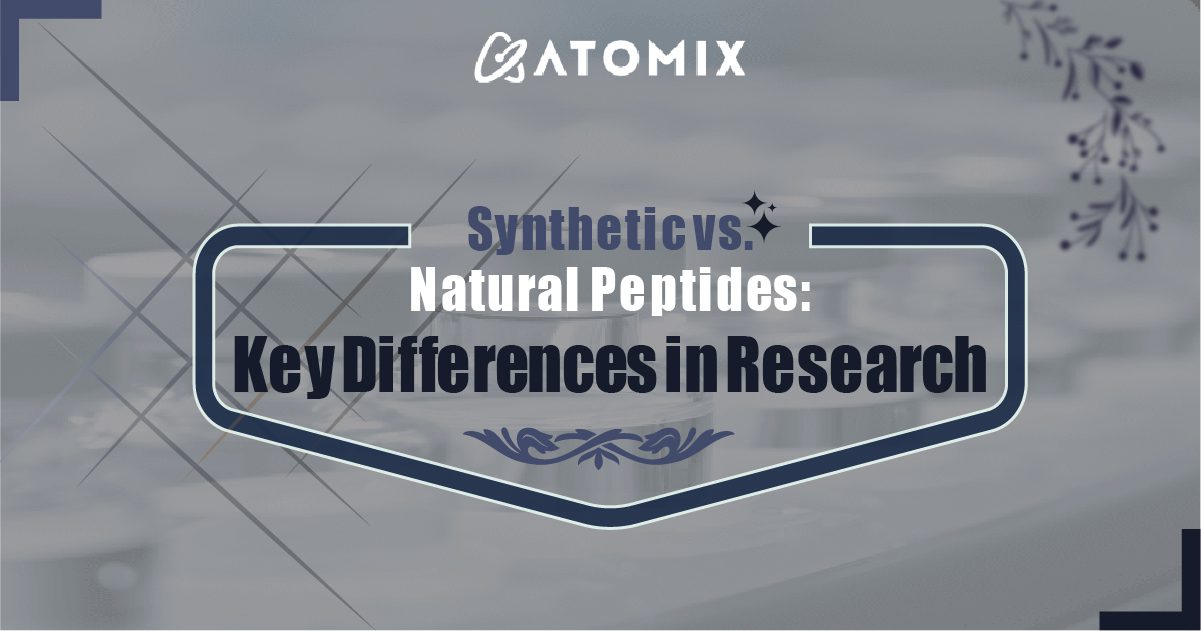Synthetic vs. Natural Peptides: Key Differences in Research

Peptides are among the most fascinating topics in modern biological study. They hold the key to countless discoveries, from their role in cellular communication to their potential in drug development. Yet, within peptide science, researchers often face a crucial question: should we study synthetic peptides or natural peptides? Both are essential, but they differ in ways that can significantly influence experimental outcomes.
This article examines the primary distinctions between synthetic and natural peptides and why these differences are significant for researchers.
What Are Peptides?
Peptides are short chains of amino acids linked by peptide bonds. They function as messengers, signaling molecules, and structural components across nearly every biological system. Some peptides regulate hormones, others stimulate tissue repair, and many serve as part of the body’s defense mechanisms.
Because of this versatility, peptides have become a central focus in drug development, disease modeling, and biochemical research.
Natural Peptides: Derived From Living Organisms
Natural peptides occur in humans, animals, plants, and even microorganisms. A well-known example is insulin, a peptide hormone produced by the pancreas. Similarly, antimicrobial peptides in plants and animals help fight infection.
Researchers usually extract these peptides from blood, tissues, or cultured cells. While natural peptides provide an authentic picture of how molecules function within living systems, they come with challenges:
- Limited availability: Extracting sufficient amounts is often costly and time-consuming.
- Purity concerns: Natural extraction may include impurities or variations, making reproducibility difficult.
- Stability issues: Natural peptides can degrade quickly outside the body, complicating storage and handling.
Despite these challenges, natural peptides remain invaluable for understanding molecular behavior in real biological contexts.
Synthetic Peptides: Engineered With Precision
Synthetic peptides are produced in laboratories through advanced techniques such as solid-phase peptide synthesis (SPPS). This process enables scientists to assemble amino acids in a precise sequence, creating peptides that are identical—or even superior—to those found in nature.
Key benefits of synthetic peptides include:
- High purity and consistency: Modern synthesis methods produce peptides with 98-99% purity, ensuring reliable results.
- Scalability: Large batches can be manufactured on demand, removing supply limitations.
- Customization: Researchers can modify sequences, add labels, or increase stability to suit specific experimental needs.
- Reduced ethical concerns: Synthetic peptides eliminate the need to source from animals or humans.
Synthetic peptides enable research to surpass natural limits. For example, modified versions can resist enzymatic breakdown, enabling longer studies or enhanced therapeutic potential.
Key Differences That Impact Research
When comparing natural and synthetic peptides, researchers should consider the following factors:
- Source and Availability
Natural: Extracted from living organisms, often limited in supply.
Synthetic: Produced in controlled lab settings, virtually unlimited. - Purity and Reproducibility
Natural: May contain variations or contaminants.
Synthetic: Highly reproducible, with consistent batch quality. - Ethical Considerations
Natural: Requires collection of biological materials.
Synthetic: Avoids animal and human sourcing, reducing ethical concerns. - Customization and Innovation
Natural: Reflects biological authenticity but allows little room for modification.
Synthetic: Enables design, labeling, and improved stability for innovative research. - Cost and Efficiency
Natural: Extraction is expensive and labor-intensive.
Synthetic: Although the initial setup can be costly, large-scale synthesis becomes efficient and cost-effective over time.
Why Both Are Important
The choice between natural and synthetic peptides is not absolute—both are valuable. Natural peptides provide authenticity, revealing how molecules interact in living systems. Synthetic peptides, however, deliver flexibility, reproducibility, and innovation.
Many research projects combine both approaches: natural peptides to model biological processes, and synthetic peptides to test hypotheses, validate findings, or explore therapeutic applications.
Final Thoughts
Peptide research is advancing rapidly, and both natural and synthetic peptides remain central to discovery. Synthetic peptides bring consistency, scalability, and innovation, while natural peptides anchor studies in biological authenticity.
For researchers, the decision often depends on their goals: replicating a natural process as closely as possible or utilizing highly pure, modifiable, and reproducible molecules.
At Atomix Research, we are committed to delivering the highest-quality synthetic peptides for research purposes. Whether you are studying signaling pathways, developing new therapies, or conducting foundational biochemical studies, the right peptides can make all the difference.
